
views
- Give your friends some space, and let them know you’d like to talk about the situation whenever they’re ready.
- Listen to your friends’ points of view and validate their feelings by telling them they have a right to be upset.
- Apologize sincerely, and promise your friends that you’ll work on changing your behavior in the future.
Talking to Your Friends
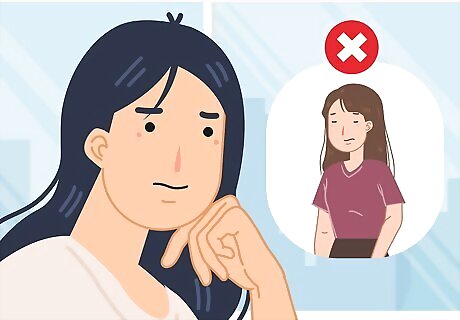
Give your friends some space if they need it. Sometimes after a big fight, it’s not a good idea to talk about things right away. If you ask your friends to meet up and they say no, give them some time. Then, try reaching out in a day or two to see if they’d like to chat. Making a friend talk to you before they’re ready can result in an even bigger fight. It’s a much better idea to let your friends calm down and collect their thoughts before you talk to them. Put the ball in their court if they’re ignoring you by saying something like, “I know you’re upset right now, and I’m going to leave you be. I’d really like to talk when you’ve calmed down. Text me whenever you’re ready.”
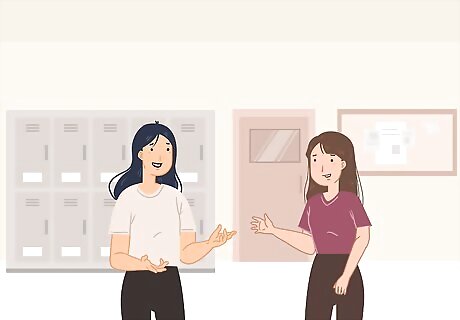
Ask your friends to meet up in person. Choose a place where you can talk uninterrupted. To keep tempers and voices down, try a public place, like a coffee shop or restaurant. Let them know the reason you're asking them to meet. For instance, you might say, “We really need to talk about what happened the other day. Can we get together tomorrow after class?” Talking in person after a fight is ideal. That way, you can listen to your friends’ tones of voice and read their body language while you chat. If you can’t meet up in person, try talking to your friends over the phone.
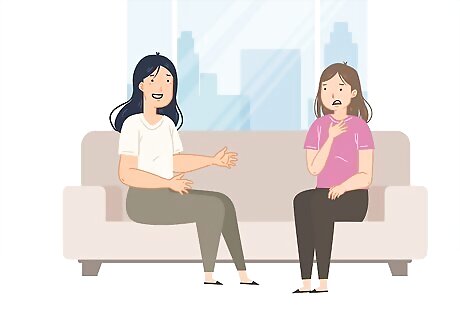
Give your friends a chance to share their feelings. It's unfair to try to jump straight into apologizing if your friends haven't said their piece. Give them the opportunity to vent their frustrations and explain what you did to make them so mad. Use this as a learning experience to help you deal with other issues in the future. Sometimes, we think our friends are mad at us when they really aren’t. If your friends aren't actually upset, they’ll probably explain why they might be acting distant while they share their feelings.
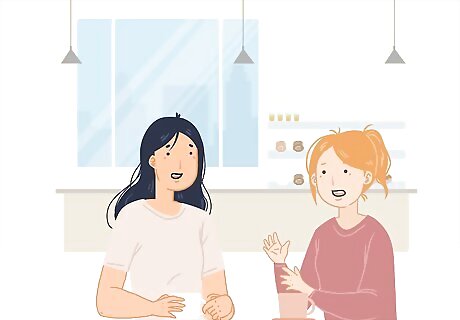
Listen and stay calm. It can be tough to listen to someone talk badly about you, even when it's true. However, the key is to not get defensive or angry here. Interrupting, excusing, or defending will only make matters worse. It's important to remember that when someone says you've hurt them, you don't get to say that you didn't. So, hear them out. Try to avoid reacting with emotions when your friend is talking. Getting angry or upset will likely make your friend feel like you aren’t truly listening, so do your best to stay calm the whole time. If your friends are mad for no reason or you don’t really understand why they’re upset, ask them clarifying questions. Things like, “What do you mean by that?” or, “I’m not really understanding—could you explain?” will help you understand what your friends mean.
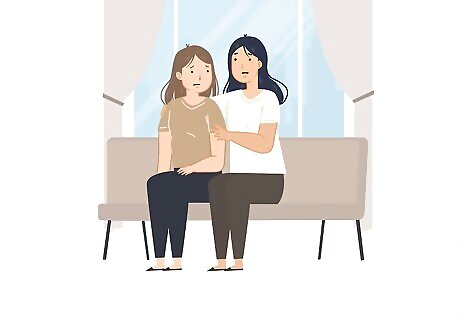
Try to step into their shoes. Practice empathy by trying to separate the current situation from who you are as a person. Take a moment to step out of your own point-of-view and into your friends’. Chances are, what they’re saying may have some truth to it. How would you feel if the same thing had been done to you? That’s probably pretty close to what your friends are feeling.
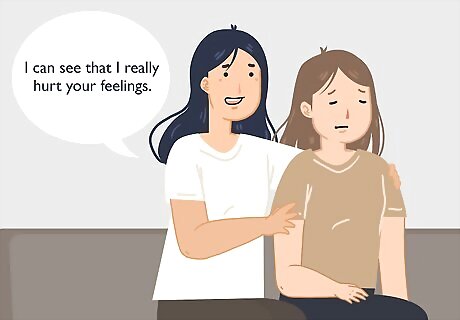
Validate how they feel. Tell your friends that you understand why they feel the way that they do. Let them know that their reaction makes sense to you and that they’re right to be angry. You might say something like, “You know, I can see why you're angry”, or “I can see that I really hurt your feelings.”
Making Up
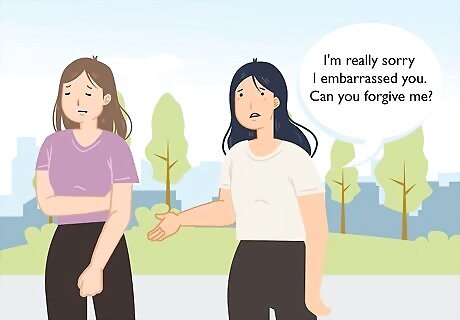
Apologize and admit it if you were wrong. Tell them you're sorry and ask for their forgiveness. Be as specific as possible so your friends understand that your apology is genuine. Say, “I'm really sorry I embarrassed you. Can you forgive me?” Speak in a soft and sincere tone of voice, and make eye contact the whole time. Only apologize if you feel like you were actually wrong. Otherwise, your apology will be insincere.
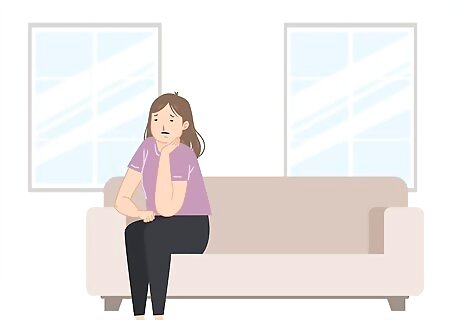
Give your friends some space. In some cases, your friends may need a little time before they can completely mend fences with you. Don't jump the gun and expect that things will be back to normal simply because you apologized. Let them have some time to get over the situation so that you can start fresh. If the situation happens to be a misunderstanding in which you didn't do anything wrong, time apart may help both sides to see the situation more clearly. That way, you can move past it more easily.
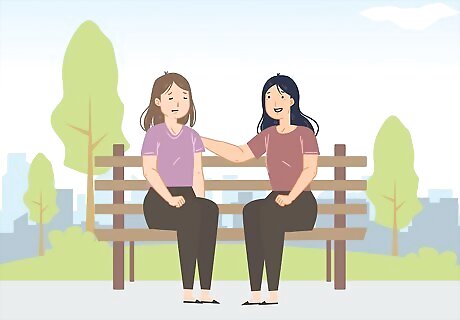
Ask what you can do to make it better. Go to your friends and see how you can resolve the situation so that your relationships don't suffer. Be open-minded about what they may suggest. Be willing to put in some effort and work to strengthen your friendship. Say something like, “I know I really hurt you guys. Is there anything I can do to make it up?” If you spilled a secret, your friends might ask that you never do that again. They may also ask you to give them some time before they trust you with any new information.
Strengthening the Friendship
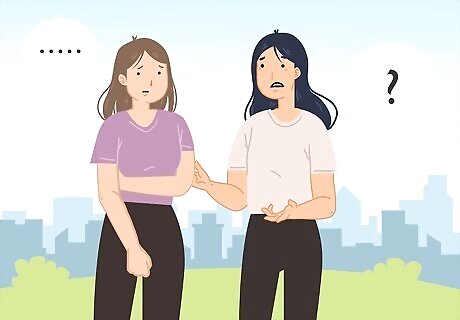
Address the problems that caused the fight. Asking what you can do to make things better is only half of the solution. If you want to maintain the friendship with your pals, commit to making changes within yourself to prevent similar problems from occurring in the future. For instance, if your friends were angry because you stood them up to hang out with your girlfriend, let them know that it won't happen again. It may help to set aside special times or days to hang out with friends or hang out with your partner.

Let them know how important they are to you. If you have betrayed, hurt, or humiliated a friend, they may need reassuring that you still care for them. Remind your friends that you still love them and that they are important to you. Don't grovel or overdo it, though—this may come off as insincere. You might say, “We’ve all been friends since third grade. I love you guys, and I can't imagine my life without you.” You might also do something nice for them, like buying a card or making friendship bracelets.

Spend quality time with your friends. The best way to strengthen your friendship is by spending quality time together. Prioritize hanging out and chatting with your buddies over the next few days and weeks. This shows them that you are making an effort and backs up your claim that the friendship is important. When you hang out with your friends, don’t bring up the situation that caused the fight. Talking about the situation over and over can make your friends feel overwhelmed or uncomfortable.

Use your conflict as a learning moment. Many people avoid conflict with those they care about because it is painful. However, fights between friends help you recognize areas where you need to grow. Plus, making up often helps you remember why you care about one another in the first place. Conflict may be useful for growth, but friends shouldn't always be fighting. Be wary of friends who are always starting fights or always blaming you for something. Arguments can also be a way to manipulate friends. Remember to offer balance during conflicts. Listen to the other person's concerns and validate them. This will encourage more constructive dialogue. Also be aware of when it is time to move forward and leave a problem in the past.



















Comments
0 comment